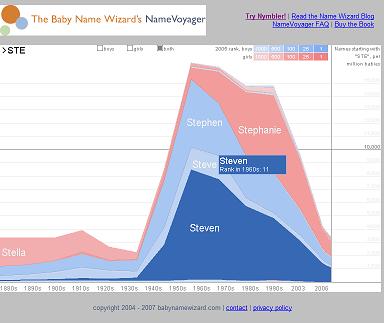John Horgan on Gerald Edelman, “practitioner of ironic neuroscience”
November 2, 2007
John Horgan’s critique of Gerald Edelman
More on Edelman, from Conscious Entities…
books on the mind, consciousness, cognitive science…
November 2, 2007
John Horgan’s critique of Gerald Edelman
More on Edelman, from Conscious Entities…
October 28, 2007
I’m nearly through reading Steven Pinker’s Stuff of Thought: Language as a Window into Human Nature. So far I’ve especially enjoyed the chapter on names, which includes discussion on sense vs reference in relation to meaning, a good summary of Saul Kripke’s Naming and Necessity
(see also Wikipedia), new words. and baby names.
Pinker’s discussion of neologisms leads to a reflection on the categories of things we have words for:
‘Words tend to be reserved for whole entities (“rabbit,” not “undetached rabbit parts”), for stable qualities (“green,” not “green until 2020 and blue thereafter”), for natural kinds, for events that are terminated by a single change of state or a single goal, for artifacts with a function, and for actions with a salient cause, effect, means, or manner. And words are given to the players that have roles in the events we make assertions about, not to the assertions themselves. A sentence can be true or false, but a word cannot.
By these lights, interesting neologisms tend to fail precisely because they are interesting … because the coiner is really commenting on something rather than naming something.’ (p. 310-311)
Here are some more links related to Pinker’s discussion of names:
Project Steve from the National Center for Science Education
You can track the popularity of baby names at Baby Name Wizard’s NameVoyager (Java required). Below is a screenshot of names starting with “Ste,” including Stephen, Steven, Steve (and Stephanie):

A book referred to in the chapter:
A Matter of Taste: How Names, Fashions, and Culture Change by Stanley Lieberson

See also this earlier post: Reading list for Steven Pinker’s ‘Stuff of Thought’
October 24, 2007
TedTalks has posted a talk by V.S. Ramachandran.
TEDBlog recently posted a list of all the TEDTalks (as of mid-Oct 07). They also have talks listed by themes; here is the theme “How the Mind Works.”
Ramachandran’s 2003 Reith Lectures
Recent book:
October 21, 2007
Today’s San Francisco Chronicle (10/21/07) had an excerpt from Love and Language by Ilan Stavans: “The book’s central theme is how the concept of love – whether platonic, courtly, romantic, mystical or metaphysical – changes over time and from one civilization to another.”
Head Trip: Adventures on the Wheel of Consciousness by Jeff Warren, reviewed in the Globe and Mail, also has an intriguing website.
The Head Trip: Adventures on the Wheel of Consciousness is an entrancing taxonomy of waking, sleeping and dreaming states of consciousness. It is a book of psychology and neuroscience, and also of adventure, wherein the author not only comes to a new understanding of the relationship between the mind and the body, but—perhaps mistakenly—comes to believe he possesses thrilling and unusual consciousness superpowers. The many figures, sequential panels and mechanical devices are rendered in the author’s own hand.
